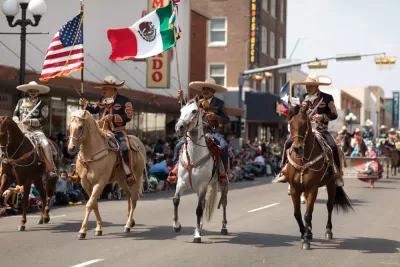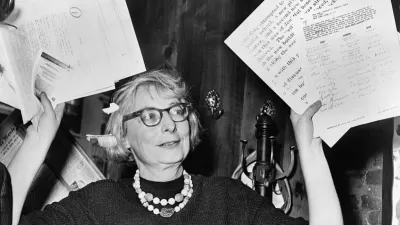In a year-long program that included bike rides, serenades, and Dragtivist performances, an art collective guided Brownsville, Texas residents in reimagining how they could influence equity and justice in their city.

One of the poorest cities in the country is in South Texas, adjacent to the Mexico border. In Brownsville, the average annual household income is $15,030, according to the American Community Survey 5-Year Estimates from 2013-2015. The Rio Grande Valley region, however, is rich with the cultural history of immigrants. More than 90 percent of households identify as Hispanic or Latinx, and many families are mixed status, meaning one or more family members are undocumented.
Finding affordable housing is difficult in Brownsville. The occupancy rate for affordable housing is near 99 percent (the ideal rate for a city of comparable size is 95 percent), and since last year, the public housing program has been at capacity, with an average wait time of 2 to 4 years. With efforts underway to revitalize the downtown area, and new industries like SpaceX making the region their home, it could become even more difficult to find affordable housing in the city. All the changes make it clear that it is extremely important for Brownsville residents and civic leaders to take a hard look at what equity in the city would and could look like.
At Las Imaginistas, a socially engaged art collective working along the U.S./Mexico border, we focus on a variety of community development issues including development of microeconomies and the inclusion of community voice in regional planning processes. As recipients of a national socially engaged art fellowship called A Blade of Grass, Las Imaginistas worked on a 12-month community engagement program in Brownsville called Hacemos La Ciudad (We Make the City).
This is what we did ...
FULL STORY: A Radically Different Planning Process in Brownsville

Planetizen Federal Action Tracker
A weekly monitor of how Trump’s orders and actions are impacting planners and planning in America.

Restaurant Patios Were a Pandemic Win — Why Were They so Hard to Keep?
Social distancing requirements and changes in travel patterns prompted cities to pilot new uses for street and sidewalk space. Then it got complicated.

Map: Where Senate Republicans Want to Sell Your Public Lands
For public land advocates, the Senate Republicans’ proposal to sell millions of acres of public land in the West is “the biggest fight of their careers.”

Maui's Vacation Rental Debate Turns Ugly
Verbal attacks, misinformation campaigns and fistfights plague a high-stakes debate to convert thousands of vacation rentals into long-term housing.

San Francisco Suspends Traffic Calming Amidst Record Deaths
Citing “a challenging fiscal landscape,” the city will cease the program on the heels of 42 traffic deaths, including 24 pedestrians.

California Homeless Arrests, Citations Spike After Ruling
An investigation reveals that anti-homeless actions increased up to 500% after Grants Pass v. Johnson — even in cities claiming no policy change.
Urban Design for Planners 1: Software Tools
This six-course series explores essential urban design concepts using open source software and equips planners with the tools they need to participate fully in the urban design process.
Planning for Universal Design
Learn the tools for implementing Universal Design in planning regulations.
Heyer Gruel & Associates PA
JM Goldson LLC
Custer County Colorado
City of Camden Redevelopment Agency
City of Astoria
Transportation Research & Education Center (TREC) at Portland State University
Camden Redevelopment Agency
City of Claremont
Municipality of Princeton (NJ)



























